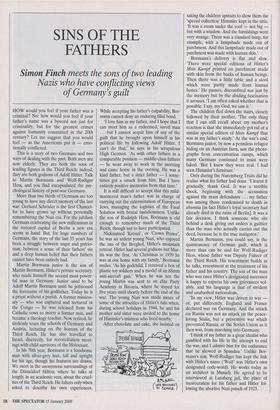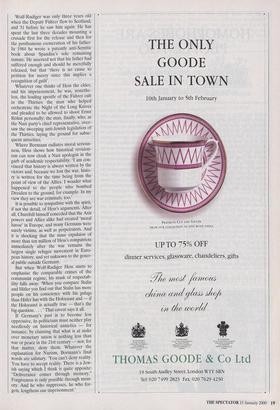SINS OF THE FATHERS
Simon Finch meets the sons of two leading
Nazis who have conflicting views of Germany's guilt
HOW would you feel if your father was a criminal? No: how would you feel if your father's name was a byword not just for criminality, but for the greatest crimes against humanity committed in the 20th century? Let me suggest that you would feel — as the Americans put it — emo- tionally conflicted.
This is a story of two Germans and two ways of dealing with the past. Both men are now elderly. They are both the sons of leading figures in the Third Reich; indeed, they are both godsons of Adolf Hitler. Talk to Martin Bormann and Wolf-Rudiger Hess, and you find encapsulated the psy- chological history of post-war Germany.
More than two thirds of Germans are too young to have any direct memory of the last war. Gerhard Schroder is the first Chancel- lor to have grown up without personally remembering the Nazi era. For the jubilant Germans celebrating the new millennium in the restored capital of Berlin a new era seems at hand. But, for huge numbers of Germans, the story of the last 55 years has been a struggle between angst and patrio- tism; between a sense of their fathers' sin and a deep human belief that their fathers cannot have been entirely bad.
Martin Bormann junior is the son of Martin Bormann, Hitler's private secretary, who made himself the second most power- ful man in Germany. Junior used to be Adolf Martin Bormann until he jettisoned the forename of his godfather. Today he is a priest without a parish. A former mission- ary — who was captured and tortured in the Congo — he was released from his Catholic vows to marry a former nun, and became a theology teacher. Now retired, he tirelessly tours the schools of Germany and Austria, lecturing on the horrors of the Third Reich. He has also travelled to Israel, discreetly, for reconciliation meet- ings with child survivors of the Holocaust.
In his 70th year, Bormann is a handsome man with silver-grey hair, tall and upright for his age, though his features are drawn. We meet in the anonymous surroundings of the Dusseldorf Hilton, where he talks at length, in an academic vein, about the cruel- ties of the Third Reich. He falters only when asked to describe his own experiences. While accepting his father's culpability, Bor- mann cannot deny an enduring filial bond.
'I love him as my father, and I hope that I can meet him as a redeemed, saved man . . . but I cannot acquit him of any of the guilt that he brought upon himself in his political life by following Adolf Hitler. I can't do that,' he says in his scrupulous High German. 'As with other fathers in a comparable position — middle-class fathers — he went away to work in the morning and came home in the evening. He was a kind father, but a strict father — I some- times got a smack from him. But I have entirely positive memories from that time.'
It is still difficult to accept that this mild- mannered man's father was in charge of carrying out the extermination of European Jews, managing the logistics of the Final Solution with brutal fastidiousness. Unlike the son of Rudolph Hess, Bormann is old enough to remember much of the Third Reich, though not to have participated.
Nicknamed `Kronzi', or 'Crown Prince', he was an ardent young Nazi, who enjoyed the run of the Berghof, Hitler's mountain retreat. Hitler had several godsons but Mar- tin was the first. 'At Christmas in 1939 he was at our home with my family,' Bormann smiles. 'As his godchild, I received a box of plastic toy soldiers and a model of an 88mm anti-aircraft gun.' When he was ten the young Martin was sent to an elite Party Academy in Bavaria, where he stayed for five years until shortly before the end of the war. The young Nazi was made aware of some of the atrocities of Hitler's rule when, during school holidays in 1944, he and his mother and sister were invited to the home of Himmler's mistress who lived nearby.
After chocolate and cake, she insisted on taking the children upstairs to show them the 'special collection' Himmler kept in the attic. 'It was a room under the roof — not big — but with a window. And the furnishings were very strange. There was a standard lamp, for example, with a lampshade made out of parchment. And this lampshade made out of parchment was made with human skin.'
Borrnann's delivery is flat and slow. 'There were special editions of Hitler's Mein Kampf printed on parchment made with skin from the backs of human beings. Then there was a little table and a stool which were partly made from human bones.' He pauses, discomfited not just by the memory but by the abiding fascination it arouses. 'I am often asked whether that is possible. I say, my God, we saw it.'
The children fled down the stairs, closely followed by their mother. 'The only thing that I can still recall about my mother's reaction is that she immediately got rid of a similar special edition of Mein Kampf that was in my father's study.' At the war's end, Bormann junior, by now a penniless refugee hiding on an Austrian farm, saw the photo- graphs from concentration camps, which many Germans continued to insist were faked. 'But I knew they were real. I had seen Himmler's furniture.'
Only during the Nuremberg Trials did he realise what his father had done. 'I learnt it gradually, thank God. It was a terrible shock, beginning with the accusation against the main defendants . . . my father was among those condemned to death in absentia [in fact Hitler's loyal secretary had already died in the ruins of Berlin]. It was a fair decision. I think someone who sits behind a desk giving out orders is guiltier than the man who actually carries out the deed, because he is the true instigator.'
Martin Bormann, you could say, is the quintessence of German guilt, which is more than can be said for Wolf-Rudiger Hess, whose father was Deputy Fiihrer of the Third Reich. His resentment builds as he talks, resentment at the treatment of his father and his country. The son of the man who was once Hitler's designated successor is happy to express his own grievances vol- ubly, and his language is that of strident and unabashed nationalism.
'In my view, Hitler was driven to war — or, put differently, England and France declared war on Germany. And the attack on Russia was not an attack on the peace- loving Stalin, but a preventive war which prevented Russia, or the Soviet Union as it then was, from marching into Germany.
'I think of my father as a great idealist who gambled with his life in the attempt to end the war, and I admire him for the endurance that he showed in Spandau.' Unlike Bor- mann's son, Wolf-Rudiger has kept the link with Hitler's name (Wolf' was Hitler's own designated code-word). He works today as an architect in Munich. He agreed to be interviewed at I anzberg jail, the place of incarceration for his father and Hitler fol- lowing the abortive Nazi putsch of 1923. Wolf-Rudiger was only three years old when the Deputy Fiihrer flew to Scotland, and 31 before he saw him again. He has spent the last three decades mounting a crusade first for the release and then for the posthumous exoneration of his father. In 1984 he wrote a patently anti-Semitic book about Spandau's sole remaining inmate. He asserted not that his father had suffered enough and should be mercifully released, but that 'there is no cause to petition for mercy since this implies a recognition of guilt'.
Whatever one thinks of Hess the elder, and his imprisonment, he was, nonethe- less, the leading apostle of the Fiihrer cult in the Thirties; the man who helped orchestrate the Night of the Long Knives and pleaded to be allowed to shoot Ernst Rohm personally; the man, finally, who, as the Nazi party's chief representative, over- saw the sweeping anti-Jewish legislation of the Thirties, laying the ground for subse- quent atrocities.
Where Bormann radiates moral serious- ness, Hess shows how historical revision- ism can now cloak a Nazi apologist in the garb of academic respectability. am con- vinced that history is always written by the victors and, because we lost the war, histo- ry is written for the time being from the point of view of the Allies. I wonder what happened to the people who bombed Dresden to the ground, for example. In my view they are war criminals, too.'
It is possible to sympathise with the spirit, if not the detail, of Hess's arguments. After all, Churchill himself conceded that the Axis powers and Mies alike had created 'moral havoc' in Europe, and many Germans were surely victims, as well as perpetrators. And it is shocking that the mass expulsion of more than ten million of Hess's compatriots immediately after the war remains the largest single refugee movement in Euro- pean history, and yet unknown to the gener- al public outside Germany.
But when Wolf-Rudiger Hess starts to emphasise the comparable crimes of the communist regime, his mask of respectab- ility falls away. 'When you compare Stalin and Hitler you find out that Stalin has more people on his conscience with his gulags than Hitler has with the Holocaust and — if the Holocaust is actually true — that's the big question. . . . 'That caveat says it all.
If Germany's past is to become less oppressive, its politicians must neither play needlessly on historical anxieties — for instance, by claiming that what is at stake over monetary union is nothing less than war or peace in the 21st century — nor, for that matter, deny them. Whatever the explanation for Nazism, Bormann's final words are salutary. 'You can't deny reality. You have to accept reality. There is a Jew- ish saying which I think is quite apposite: "Deliverance comes through memory." Forgiveness is only possible through mem- Ory. And he who suppresses, he who for- gets, lengthens our imprisonment.'



























































 Previous page
Previous page